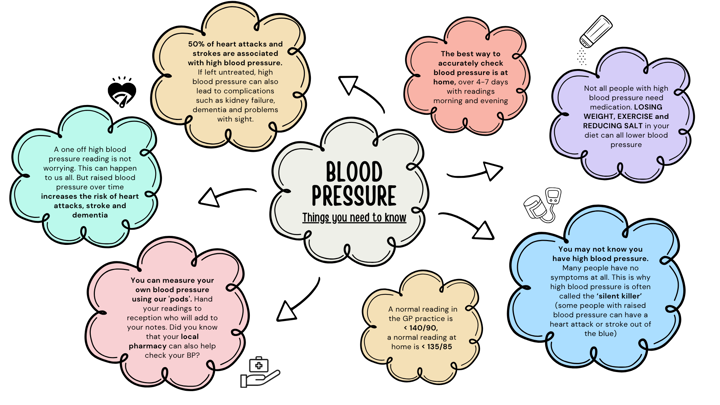Blood Pressure
Things you need to know

- 50% of heart attacks and strokes are associated with high blood pressure. If left untreated, high blood pressure can also lead to complications such as kidney failure, dementia and problems with sight.
- A one off high blood pressure reading is not worrying. This can happen to us all. But raised blood pressure over time increases the risk of heart attacks, stroke and dementia
- Not all people with high blood pressure need medication. Losing weight, exercise and reducing salt in your diet can all lower blood pressure
- You may not know you have high blood pressure. Many people have no symptoms at all. This is why high blood pressure is often called the ‘silent killer’ (some people with raised blood pressure can have a heart attack or stroke out of the blue)
- A normal reading in the GP practice is < 140/90, a normal reading at home is < 135/85
- You can measure your own blood pressure using our 'pods'. Hand your readings to reception who will add to your notes. Did you know that your local pharmacy can also help check your BP?
- The best way to accurately check blood pressure is at home, over 4-7 days with readings morning and evening
- Blood pressure monitors can be bought for around £20 from large pharmacies or the British Heart Foundation shop online
- It is important to buy a blood pressure cuff that fits your arm. A cuff that is too tight will give readings that are HIGHER than your actual blood pressure (false high readings). If you are overweight, please measure around your arm with a tape measure mid-way between your elbow and shoulder. This measurement will tell you the cuff size you need (if more than 42cm you will need an XL cuff). We have tape measures at our reception desks
- Pioneer’s weekly, award winning, ‘Meet in the Park’ (Blaise café, 9am Saturday mornings) is a great way to do some walking and reduce blood pressure. See our website for more details. This is suitable for all
- You might be more at risk if you are over 65, smoke, drink too much alcohol or are overweight. People who are of black African or black Caribbean descent are also at higher risk